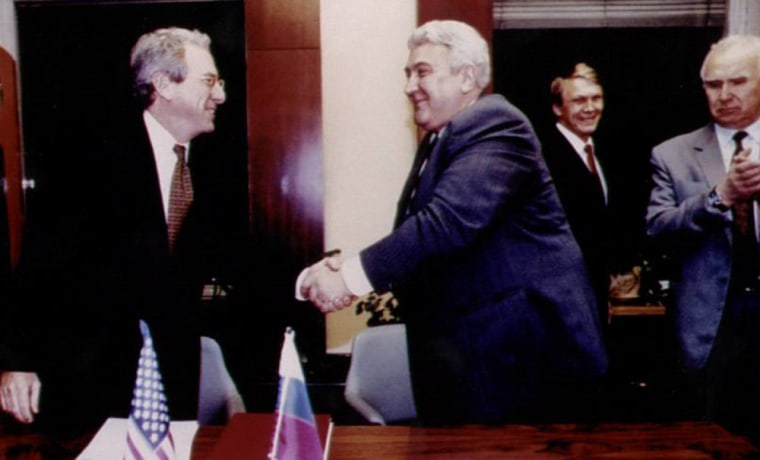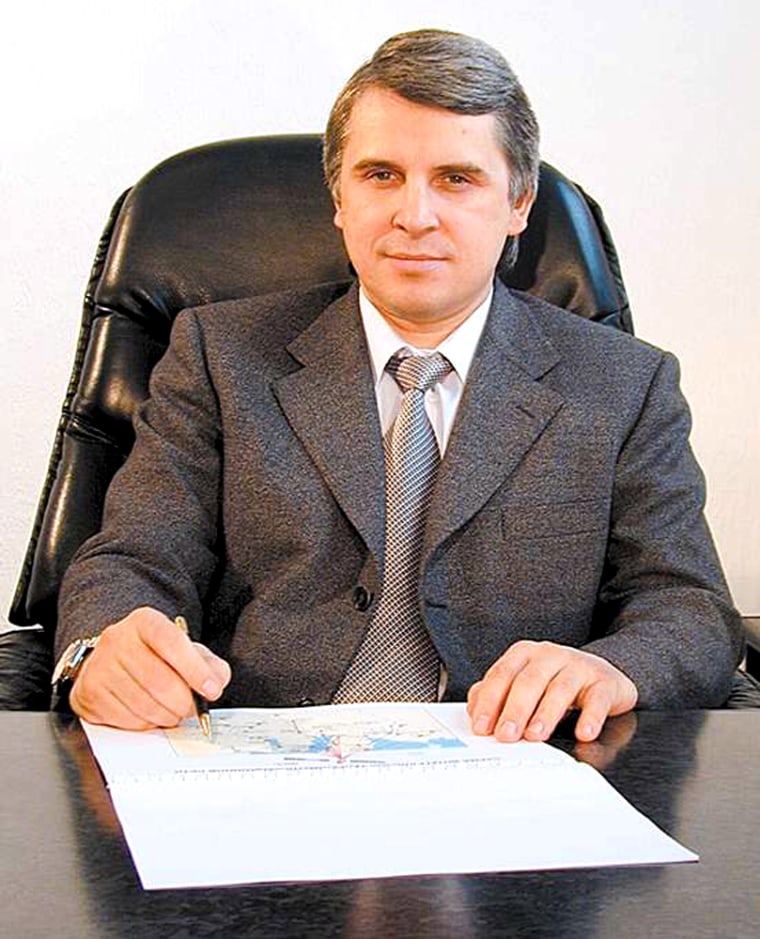A power struggle in Moscow’s space industry has erupted into public view, threatening to disrupt negotiations with NASA over astronaut access to the international space station. Representatives of the Russian government appear to be grabbing for more direct control of the last independent elements of the country's space infrastructure, using as an excuse a financial crisis that the government itself is mainly responsible for.
Russian President Vladimir Putin is said to support a proposal from the Russian Federal Space Agency to replace longtime space executive Yuri Semyonov, current president of the semi-private Energia rocket company. Energia provides much of the hardware for Russia's human spaceflight program, including space station modules as well as the Soyuz and Progress spaceships used to resupply the space station.
"With the aim of pulling Energia out of its financial crisis, the agency has nominated Nikolai Sevastianov, who has extensive experience in putting space and other major projects into practice and successfully governing high-technology companies in modern market conditions, as president of the corporation," the space agency said in a news release on Wednesday.
Russia's Itar-Tass news service quoted agency spokesman Vyacheslav Davidenko as complaining that Energia has been losing money for the past three years and is going deeper into debt.
“It is necessary to take urgent measures to preserve the corporation’s leading role and ensure its normal financing,” Davidenko said, insisting that the company needs a leader who can “work in modern economic conditions,” sell more of its products on the world market and attract foreign investment.
The Russian government has a 38 percent stake in Energia's public stock, and it urged all other stockholders to consolidate their holdings under the government’s leadership for a vote at a May 28 stockholders’ meeting. The winning candidate would serve a five-year term.
Shake-up comes amid key talks
This shake-up at the top of the Russian human spaceflight infrastructure comes just when NASA has been negotiating commercial or barter arrangements to guarantee continued U.S. access to seats aboard the Soyuz spacecraft flying between Earth and the space station. Although the Russian government’s officials have taken part in the talks, actually providing the agreed-on services would be up to the engineers at Energia.
Sevastianov, 44, used to work for Semyonov, and Semyonov picked him to head a spin-off company to commercialize communications satellites built by Energia. But in March, Russian space journalist Dmitri Pieson reported that there were growing tensions between the two executives.
Pieson wrote that replacing Semyonov was part of the space agency's “broader policy of splitting the design and management functions in industrial enterprises controlled or partly controlled by the state.” Pieson saw the move as parallel to a recent broad consolidation of the Russian aviation industry into one conglomerate that absorbed the formerly independent firms of MiG, Sukhoi, Tupolev and others.
NASA officials told MSNBC.com that they were aware of the impending changes at Energia, but they declined to elaborate on the record, saying that NASA "does not comment on personnel changes in foreign contractor organizations". The choice of words confirmed NASA's long-expressed view of the subsidiary status held by Semyonov's company.
Target of the space takeover
Semyonov, who turned 70 last month, has headed Energia since 1991 when the company was created to manage Soviet spacecraft manufacturing facilities. Although recently said to be in poor health, Semyonov is apparently not volunteering to retire.
The facility he heads dates back to 1946, when it began work on rockets and, later, space vehicles. It was headed by legendary Soviet space genius Sergei Korolyov during the space race, and the town it is located in, Kaliningrad, was renamed Korolyov in the mid-1990s.
In the 1960s, Semyonov played a leading role in developing the Soviet manned moon capsule, the Zond, although America's Apollo successes led to the cancellation of that program before any cosmonauts could fly in it. He later headed development of the Soviet space shuttle, Buran, which flew just once in unmanned mode before being mothballed.

In 1993, following the collapse of the Soviet Union, Semyonov tried to consolidate the remnants of the soviet space industry under his leadership. But he was outmaneuvered by Yuri Koptev, formerly in a Soviet government ministry overseeing space and rockets, who shaped a “Russian NASA” and reached agreements with NASA Administrator Dan Goldin to be recognized as the sole authority over Russian space activities.
Starved for funds
The main thrust of Energia's work remained the construction and operation of human space vehicles such as the Soyuz crew transport, the Mir space station, and the international space station's main living module. Although NASA paid for some of these developments, the Russian government itself, as Semyonov’s main customer, only provided funds at low levels, and usually late.
Hence, observers who talked on background with MSNBC.com found current government complaints about Energia's poor financial condition to be hypocritical, because it has been the government’s own practice of starving it for funds that has been the primary factor in the crisis.
Semyonov’s attempts to commercialize Energia's operations — including the development of a Block-D upper stage — have been largely stymied.
One of Energia's most ambitious commercial projects has been the sale of open seats aboard the Soyuz to space passengers bound for the space station. Since 2001, two seats were sold to millionaires, and several others went to European professional astronauts. But the last several private-sector candidates — including pop star Lance Bass — had to drop out due to a variety of funding and medical problems. The Russian government put its own representatives into those seats, but unlike the commercial candidates, they paid Energia nothing.
Energia also has proposed the development of a new piloted spacecraft called Kliper to replace Soyuz vehicles in the next decade. The European Space Agency has expressed interest in contributing to the project’s funding, but apparently the Russian government has not.
